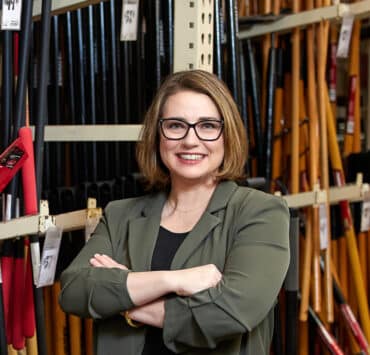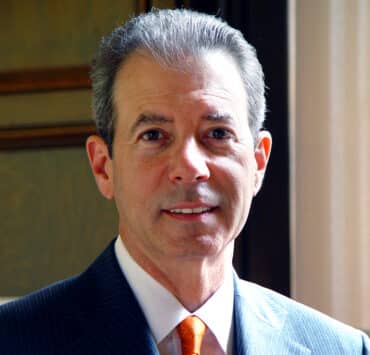College graduation was rapidly approaching, and Michelle Coon didn’t have a job lined up. So, when a career counselor organized an interview for her, she agreed to go. The opening was for an underwriter at an insurance company. There was just one problem—Coon had no idea what that meant.
But she went to the interview anyway. When it came time for her to introduce herself, she fessed up. “I told them I knew very little about the role, but I would dedicate myself to trying hard, and I promised to learn everything I could,” she recalls.
Coon didn’t get the job. She did, however, make an impression. The company’s HR team called her back a week later with another opening, and she was hired to serve as the front-office receptionist and secretary to the president. Nearly twenty years later, Coon left the organization—Aetna—as its chief operating officer.
Today, she is part of the leadership team at Charleston Area Medical Center (CAMC), the largest healthcare system in the state. Eight thousand employees at CAMC’s four hospitals, cancer center, and other facilities serve communities in and around the capital city. The system known for its innovations in robotic surgery and pediatric intensive care is its area’s only comprehensive stroke center, and also operates a Level I Trauma Center. Coon serves as president of the West Virginia Health Network and vice president of managed care and population health at CAMC Health System.
“The people we help are my neighbors. I see them at the store, in our schools, and at church, and I’m thankful my career has given me a chance to serve them.”
Michelle Coon
Focusing on population health and improving quality is a mission the native West Virginian takes seriously. “I love this state and have been here my whole life,” she says. “The people we help are my neighbors. I see them at the store, in our schools, and at church, and I’m thankful my career has given me a chance to serve them.”
“What makes Michelle so effective in her role is how she views things through the lens of the individuals her organization serves,” adds Tadd Haynes, president of UniCare Health Plan of West Virginia, Inc., an Elevance Health company. “She is a native West Virginian and truly understands the unique needs of the communities within our state. That kind of ‘passion for the patient’ truly shines through in the leadership of her team. Michelle and CAMC really have been at the forefront of population and whole-health efforts in our state and that is why they have been such a strong partner to our organization.”
Michelle Coon has prepared herself to do just that by maintaining the attitude she demonstrated in her very first job interview. “I got my first job because I took a chance and was okay coming in as a receptionist with a college degree. I’ve learned to embrace change and stay open to new things,” she explains. And Coon is no stranger to hard work; she grew up helping in her parents’ restaurant.
After spending eighteen years at Aetna, Coon joined CAMC in 2018 to leverage her experience and build a CIN from the ground up. CINs are organizations designed to engage communities, provide access, unite providers, and place patients at the center. Deploying these systems is important in a rural state like West Virginia, which has experienced plummeting rates for physicals, vaccinations, and routine screenings since the start of the COVID-19 pandemic in 2020.
“We are doing all we can to remove barriers and get patients the care they need when and where they need it,” says Coon. Her team worked closely with community partners and other organizations to launch what has become known as the West Virginia Health Network. CAMC was the first member, and four years later, the network is a state-wide organization where dozens of physicians, hospitals and health systems share data and collaborate to increase quality of care and reduce costs, while driving health outcomes.
“We are doing all we can to remove barriers and get patients the care they need when and where they need it.”
Michelle Coon
The team behind the network spent two years forming connections and onboarding patients. They spent another two years growing their system and membership. Now, less than five years after its inception, the West Virginia Health Network has 120,000 beneficiaries.
Michelle Coon remains focused on maintaining the impressive momentum. That happens when care coordinators get out into local communities and host events, such as free screenings. The screenings help patients lacking transportation to medical facilities, but many people in West Virginia lack something else—healthy food. In fact, the state has more cases of high blood pressure, diabetes, and obesity than any other in the nation.
Thus, the Farmacy program was born. Coon found one member of the health network that could identify a group of diabetic patients experiencing food insecurity. They then used a special grant to bring fresh fruits and vegetables on site. As patients came to receive their delivery of healthy food, they also were able to interact with care providers, learn exercises, and find other resources to help improve their health and wellbeing. In one iteration, instructors taught participants how to cook and even can the food.
The network continues to grow and Coon is finding ways for those on her team to make significant contributions. “Mentors had faith in me earlier in my career, and now I want others to be part of opportunities they can learn from,” she says.
Farmacy Program and similar initiatives are thriving. Michelle Coon plans to expand the food insecurity program statewide and is not content to stop it or other efforts at the edges of the Ohio River or Appalachian Mountains. The VP with a track record of continuous learning and trying new things wants to find ways to reach beyond state lines.
“There is so much we can do through telemedicine, mobile units, and other innovative solutions,” she says. “This is just the start, and we’re committed to finding creative ways to bring services to people and communities that need access to quality healthcare.”


